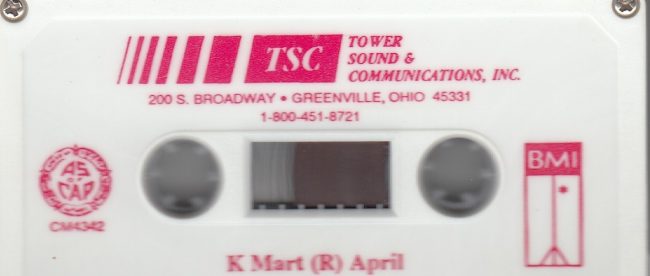Music in the Key of K

From the 1970s and into the 1990s, Kmart was a retail behemoth in the United States. Half department store, half discount destination, the chain was a great place for American consumers to go to get virtually anything — clothes, home decor, toys, VHS movies and music on tape, greeting cards, random tchotchkes, and over time, even food. At its peak in 1994, there were nearly 2,500 Kmarts throughout the country. But times have been tough since. Feeling pressure from Target, Walmart, and of course, the Internet, Kmart has gone through two bankruptcies and an ill-fated merger with Sears. Today, there are fewer than 100 Kmart stores remaining.
For consumers, losing Kmart wasn’t great, but it wasn’t a big deal — the competition was probably doing a better job. For something did seem lost forever: the music of Kmart.
If you were a Kmart shopper in the late 1980s and early 1990s — and, to be fair, this was true if you shopped at many other stores, too — you almost certainly got to experience the in-store radio network. Unless employees needed to make an announcement via the store’s public address system, guests were treated (or subjected to, depending on your taste) to what Vice described as “ephemeral muzak [ . . .] that was created [ . . . ] to keep shoppers from ever accidentally confronting silence.” For those of us who experienced the music first hand, that probably seems apt. For those who haven’t though, words alone can hardly do the music justice.
But thanks to a prescient former Kmart employee with an odd hobby, you don’t have to imagine what it sounded like. You can listen.
From 1989 to 1993, a guy named Mark Davis worked at the now-shuttered Kmart in Naperville, Illinois. A teenager working his first job, the music became a large part of his life — and one he wanted to hold onto. It turned out that the Kmart radio network wasn’t actually transmitted via radio — the music was sent to stores by the corporate headquarters on cassette tapes. And when new tapes arrived, the old ones often made their way to the trash. That’s when Davis stepped in, as he told NPR:
So it was my first job, and I was working for Kmart. And I was on the sales floor. And these songs rotated, like, every hour or two. And so you’re working a lot of eight hour shifts and weekends. You get to know these songs. You actually get to like the songs to a certain extent.
So I had access to the service desk when I had first started. And I went behind to take a look at the sound system ’cause I’m a technical guy and wanted to see how it worked. And I noticed that it was November, and there was an October tape sitting there. So I decided to take it as kind of a memento to my first month working at Kmart. I continued this collection every month.
Over the course of his technically-thieving-but-really-who-cares tenure, Davis saved nearly five dozen cassettes from the literal dustbin of history. And then, twenty years or so later, he uploaded them to the Internet.
As Vice aptly summarizes, “Davis has inadvertently created an extremely valuable time capsule—one that suggests a bygone culture’s subconscious. Where most cultural time capsules focus on the highlight reel of an era, or the blooper reel, here lies something almost never documented: the unspeakably mundane.” And if you think that description of the music is unfair, you can judge for yourself. Davis’s full collection — augmented by some uploads from others who happen to have old Kmart recordings — can be found on the Internet Archive, here. (There’s probably more music than you can get through in a reasonable sitting, so if you need a place to start, try this generic April 1992 cassette.)
Bonus fact: One Kmart store probably isn’t going anywhere anytime soon (pandemics notwithstanding). The Kmart in Tamuning, Guam, opened in 1997 and has only thrived since, but for the strangest of reasons: it’s become a tourist attraction. As the Wall Street Journal notes, “the store, open 24 hours a day, also seems beyond the reach of time itself. Inside, it feels more like 1980, when Kmart ruled the big-box retail market.” Nostalgic tourists (who happen to be visiting the island for other reasons, one hopes!) often swing by to take selfies and otherwise share the retro experience with family and friends back home.
From the Archives: Targetting Crime: Kmart didn’t innovate as much as it needed to. Target, however, innovated so much, it became a crime lab.
